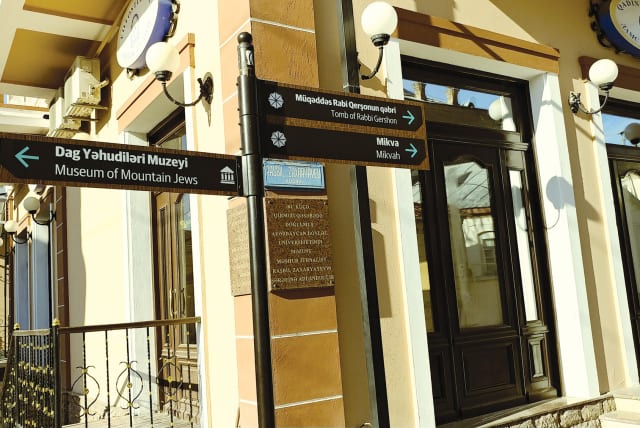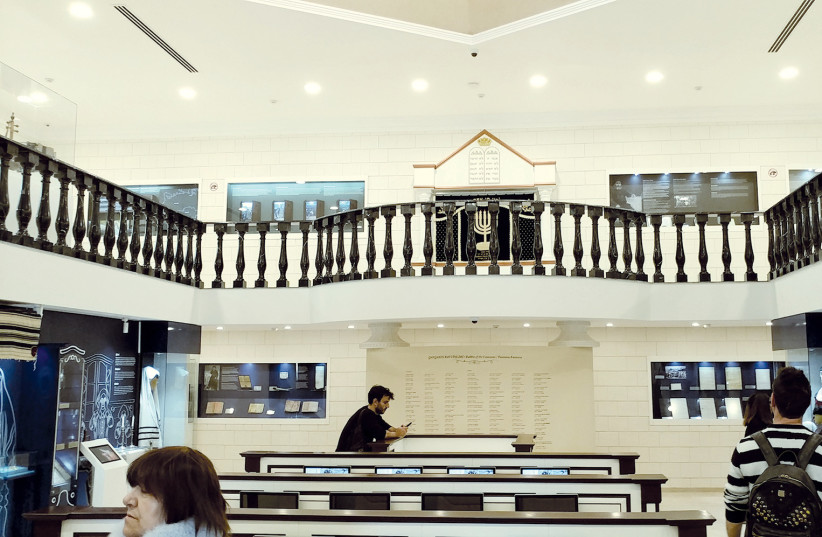Azerbaijan is a true friend of Israel and the Jewish people

Azerbaijan isn’t just a friend of Israel’s. It is also a friend of its Jews. Locals tout the country as a model of interfaith harmony
Imagine a place in the world where Jews can’t recollect the last time they’ve seen antisemitism. Imagine that same place, where Israel is much venerated and valued to the extent that the two countries would be worse off without each other. It’s not a fantasy or fiction or a far-off vision of the future. It is the strange story of Azerbaijan, a country which few in the West know about, never mind could point out on a map. With a population of ten million, sandwiched between Russia and Iran, it’s roughly the size of Austria.
And it seems to have something of an untold tale: It’s a good friend of Israel and the Jewish people.
In recent news, Azerbaijan became the first Shi’ite Muslim country to open an embassy in Israel (last November), adding its ambassador placement in January. It was the latest in a string of close, cooperative measures between the two countries.
Azerbaijan provides 40 percent of Israel’s gasoline. For its part, Israel provides “ag” tech, wide-ranging modern cellular infrastructure, and de-mining technology, in the newly liberated Karabakh area that had been under Armenian occupation for 30 years. Israel was one of the first nations to recognize Azerbaijan’s independence in 1991, and placed its embassy in Baku a year later.
“The relations between the countries are developing since Azerbaijan regained independence. And these relations are very stable. Not once in the last three decades have we had any major differences. And apart from it, there are very strong people-to-people bonds,” Baku [Azerbaijan’s capital] parliamentarian Nigar Arpadarai told The Jerusalem Report. She noted that Azerbaijan recently opened a tourist office and trade representative office in Israel. “I am glad I could express my gratitude to Jewish friends though voting for a permanent embassy in their country.”
She added: “We have perfect relations with Israel... you won’t believe it, but we really have governmental consensus. We are clear, and our position on our Jews is clear.”
Then-Israeli prime minister Yair Lapid applauded the embassy move. In a statement, he noted: “Azerbaijan is an important partner of Israel and home to one of the largest Jewish communities in the Muslim world. The decision to open an embassy reflects the depth of the relationship between our countries. This move is the result of the Israeli government’s efforts to build strong diplomatic bridges with the Muslim world.”
As recently as October 2022, Israel’s now-former defense minister Benny Gantz made a diplomatic visit to Azerbaijan and met with his Azeri counterpart, Zakir Hasanov, and the country’s president, Ilham Aliyev. Reports say they discussed security issues.
Azerbaijan is a beacon of safety for the Jews
But Azerbaijan isn’t just a friend of Israel’s. It is also a friend of its Jews. Locals tout the country as a model of interfaith harmony, where the nation embraces and protects the Jewish community – the largest in the Muslim-majority world. Scant antisemitism, to anyone’s recollection. In fact, its synagogues and Jewish schools aren’t flanked by security details the way one might see in the Americas or Europe.
So while antisemitism is rapidly rising in some countries, this former Soviet republic has long been a beacon of safety going back many centuries. “I feel sorry it’s not the same in other countries,” Arpadarai said. “The politics of the country was always that we treat people well.” Locals say there’s no second thought as to wearing a kippah in public.
Rabbi Zamir Isayev, chairman of the Georgian Jewish community, said that about 20,000 Jews live in Azerbaijan. Isayev, who is the director of one of the two Jewish schools in Baku, said that about 170 children attend. Like its public school counterparts, he said the government covers costs for Jewish education (with the exception of busing).
There are seven synagogues, the rabbi added, with three in Baku servicing the ethnic and liturgical needs of Georgian, Ashkenaz, and Mountain Jews (the ethnic branch of Azerbaijani Jews).
Several other cities are home to Jewish communities, including the 3,000 who reside in the Qirimizi Qaseba, or “Red Village,” – named for the proliferation of red roofs.
In the 1740s, the village was officially created by Fatali Khan, the local Muslim leader, in an effort to preserve the Jewish community. Before the Soviets occupied the area (1917-1990), there were 13 synagogues in the one town.
Its residents, who identify as Mountain Jews, have two synagogues, four rabbis, and a new multimedia Jewish museum. The Jewish Museum, among its wall-to-wall artifacts of centuries of Jewish life in the area, reveals that Jews have lived in the area going back two millennia.
“The coexistence of Jews and Muslims here is not at all a recent fact but, as we have seen, for centuries,” noted Rolan Yusufov, deputy head of the representative office at STMEGI-Azerbaijan International Charitable Fund of Mountain Jews.
The Red Village’s Gilaki synagogue was built in 1896, usually getting 15 people for minyanim but bursting during the summer. It is home to seven Torahs. The Six Dome Synagogue was built circa 1888.
The maintenance coordinator for Six Dome Synagogue, Anatoliy Manasirov, was born in the Red Village, where he’s spent his life. “I have never seen antisemitism in this country,” he emphatically said, adding that he is baffled how other places have this problem. Israelis appear to have caught wind of this town’s tourist attractions, as during spring and summer at least one bus a day of Sabras comes through, he noted.
Carrying the proverbial torch of interfaith outreach, Arzu Jaeed, though a Muslim, directed a documentary about the Red Village titled Jerusalem of the Caucasus: The Undiscovered Jewish Heritage in the Land of Fire.
“While I was so into the filming, I suddenly realized that it was suspiciously quiet. When I zoomed back to the street and turned to look at what was happening behind me, I saw people standing super quietly on both sides of the roads. Someone far away was voluntarily rerouting the cars, a man shushing for someone else to be quiet. It was the sweetest moment, the moment when you realize that what you doing matters for those people,” said the Azerbaijani, now living in Washington, DC, and working at Google.
“I was standing there to tell their story, and they were helping me to do it the best way possible, even though I never wanted to bother them even for a second. It was beautiful.”
In Ganja, the country’s second-largest city, Arif Babayev oversees the Jewish community of 300 families, whose religious needs are taken care of by the Baku community and the government. It’s “strange,” he said, that other places in the world harbor such “senseless hate towards the Jewish people. We believe in coexisting and respect,” he insisted.
“It has always been a place where all faiths can live in peace, for many centuries.” Representatives say that all these communities are self-sustaining Jewishly, with access to kosher food, rabbis, teachers, Jewish centers, books, schools, and a mohel.
When Jaeed was asked how or why Jews are embraced so famously as brethren, as a matter of course, she said: “That’s a million-dollar question. A new generation of Azerbaijanis growing inside, or outside, of Azerbaijan see this relationship and absorb it to the fullest. We went through so many historical injustices shoulder to shoulder, so you are my brother, my friend. We share one country and traditions.”
Israel’s ambassador to Azerbaijan, George Deek, had another take on it, where the nation found cohesion among its fellow countrymen as a reaction to outside forces. “People here were used to being bullied by Russia, Turks, Iran, Armenia (in two recent wars). It was always important to preserve identity and culture.”
As an important side point: One of the country’s most celebrated national war heroes is tank man Albert Agarunov, much revered by Azerbaijanis. He died in battle in 1992 during the first Karabakh War in Susa while defending his battalion against Armenian tanks.
“We are all Azerbaijani, and it doesn’t matter what you believe,” stated Rabbi Isayev. He quickly added that there are interfaith celebrations, including Muslims that attend Hanukkah parties and Shabbat dinners, which continue the country’s long tradition of bridge-building.
“Tolerance isn’t some buzzword,” said Isayev. “So many places boast to the world that they are multicultural, but having many cultures doesn’t mean that people have acceptance.” ■
Jerusalem Post Store
`; document.getElementById("linkPremium").innerHTML = cont; var divWithLink = document.getElementById("premium-link"); if (divWithLink !== null && divWithLink !== 'undefined') { divWithLink.style.border = "solid 1px #cb0f3e"; divWithLink.style.textAlign = "center"; divWithLink.style.marginBottom = "15px"; divWithLink.style.marginTop = "15px"; divWithLink.style.width = "100%"; divWithLink.style.backgroundColor = "#122952"; divWithLink.style.color = "#ffffff"; divWithLink.style.lineHeight = "1.5"; } } (function (v, i) { });

